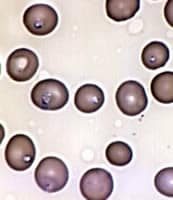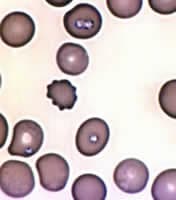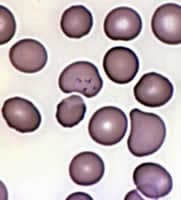
Monthy Case Studies - 1999
Case #26 - December, 1999
The following images were captured from a Wright-Giemsa stained thin blood film (100×). The patient is a 70-year-old woman from New Jersey. She has no history of travel outside the continental United States. She had a fever and was disoriented ten days prior to seeking medical attention. Her blood test at a hospital in New Jersey showed pancytopenia (low red and white blood cell counts). One month prior to this episode, she received two units of blood during a hip operation. What is your diagnosis? Based on what criteria?

Figure A

Figure B

Figure C
Acknowledgement: Specimen contributed by Ray Kaplan, SmithKline Beecham Laboratories, Atlanta, GA.
Answer to Case #26
This was a case of babesiosis caused by Babesia sp. Diagnostic features observed included pleomorphic appearance of the rings (Figures A and B) and a tetrad (Figure C). In order to make an accurate species identification, methods such as PCR and/or serology should be considered. This case was confirmed positive for B. microti by using both PCR and serology.
More on: Babesiosis
Images presented in the monthly case studies are from specimens submitted for diagnosis or archiving. On rare occasions, clinical histories given may be partly fictitious.
 ShareCompartir
ShareCompartir


